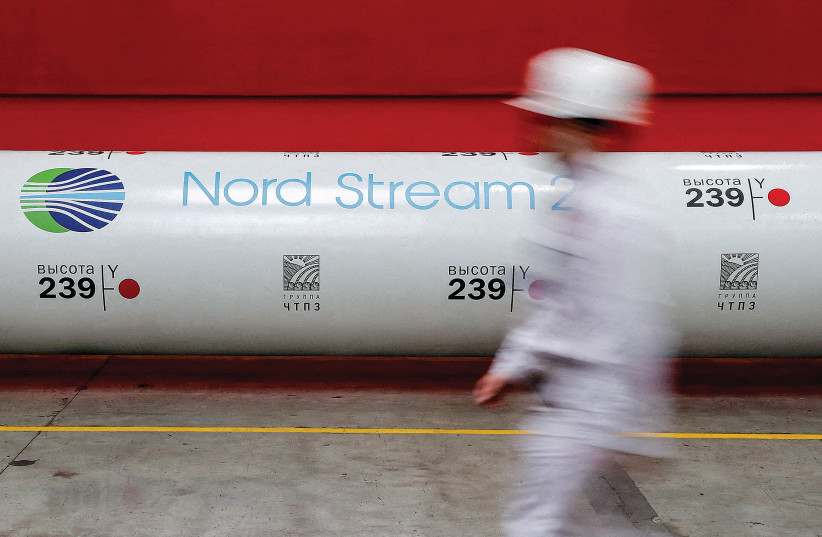Energy: who has it, who needs it and how can we secure it, are the critical questions facing every nation today. It is this single global commodity that presents Israel, with its energy rich off-shore resources, a golden opportunity to be in a commanding position when all the dust settles in Europe.
History often foretells that times of necessity will dispel our most precious allusions. And this is never so much the case, as in times of war. Today, with Russia’s full-scale invasion of Ukraine underway, plastered on every TV and all over social media, we are beginning to wake up to a global paradigm shift. Generational security doctrines and economic orthodoxies that have been rooted in a post-WWII global order are faltering in the face of a Sino-Russian alliance flexing its muscles.
Yet as tectonic shifts are taking place around parliaments and capitals around the world, it is at the kitchen table and the tightening purse strings that are the real drivers shaping these new political alignments. Nowhere has this become more evident than at the gas pump – 40% of European gas was supplied by Russia. It follows that since this energy flow has stopped, prices have surged to record levels in Europe and the United States.
Energy is the new global currency. It is then no wonder why Turkish President Recep Tayyip Erdogan, an undeniable Israel-hater, welcomed with full ceremonial pomp the president of Israel in Ankara last week. Erdogan is many things, but he is no fool, and he can see what everyone can: that Israel, if it chooses, could become the nexus point for an energy-hungry Europe desperately searching for alternatives.
This is not merely a question of supplying Europe the energy Israel possesses (estimated reserves of 800 billion cubic meters), it is the gas pipeline agreement that Israel has signed with Cyprus and Greece that is most significant. This single national project would transform Israel into a major global energy hub. Like Istanbul, Jerusalem is perfectly situated between the east and west, and this pipeline initiative is what is driving Erdogan’s crocodile diplomacy and motivating his Libyan adventure so as to make greater counter-claims on the shipping routes between Cyprus and Greece.

It is crucial moving forward that Israel’s leadership does not take its eyes off this energy conduit and allow for any foot-dragging when it comes to moving in concert with its Mediterranean allies to build this pipeline. As Vladimir Putin’s army surrounds Kyiv, necessity is commanding the high ground for Israeli policy-makers to put this obvious national interest as one of its highest priorities.
How does this translate into the reality on the ground?
First, it was smart that President Isaac Herzog met with his colleagues in Cyprus and Greece before his meeting in Ankara. It would be foolish to give Erdogan false expectations, or send mixed signals to our pipeline partners at this important juncture.
Deterrence is going to be key in Israel’s diplomacy with Turkey, and as long as the anti-Israel AKP Party is in power, deterrence is the only thing that will really make a difference.
In this light, Israel must be part of a consortium of Eastern Mediterranean nations, where Erdogan will observe he is the black sheep, not the apex predator, in this political calculus.
Second, if deterrence is a main driver with Turkey, that means a security policy becomes elemental. Israel signing for three more advanced submarines is a good start. But Israel’s navy will need to be fully upgraded all around, as Israel realizes that its future economic position is based on maritime interests.
Both Russia and Turkey have sizable navies, and Turkey over the past decade has invested heavily in strengthening its sea power and Israel must keep apace.
Third, though it may seem to be somewhat peripheral, enhancing Egypt’s cooperation in this pipeline requires Jerusalem’s attention. Egypt has the potential to be a spoiler in Eastern Mediterranean politics. Remember how we all held our breath in that brief episode where president Mohamed Morsi and his Brotherhood were in power.
And though Israel is currently supplying gas to Egypt, with Turkey dug into Libya, and its keen eye on Israel’s energy strategy, prudence requires more skin in the game for Egypt to be more closely aligned in its security with Israel, Cyprus and Greece.
Lastly, Israel must act quickly to turn diplomatic agreements into shovels in the ground. Time is money, energy is influence, but until the gas is flowing, it’s still just a good hand yet to be put on the table. If Israel will not step up at a time when Europeans are desperately seeking new energy arteries, Turkey will certainly provide alternatives.
As Prime Minister Naftali Bennett rightly gagued, Israel is in a unique position in the current conflict between Ukraine and Russia. Understanding this, Bennett was able to raise Israel’s global status by positioning itself as one of the only democracies that can act as an arbiter of peace between the two conflicting parties.
This same vantage should be taken in how we observe Israel’s burgeoning energy power. Israel has a real opportunity to be the bridge between East and West, bypassing the Bosporus, as one of the most important energy corridors on the planet.
To put it simply, not playing its energy hand now would be nothing short of a tragic national failure.
The writer is the co-founder of Jewish National Initiative and a hi-tech executive.
